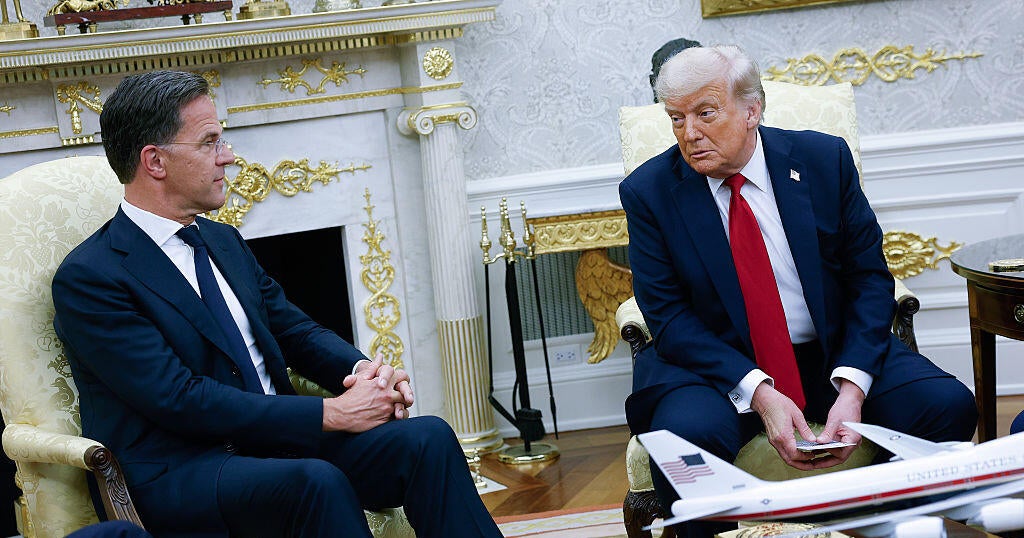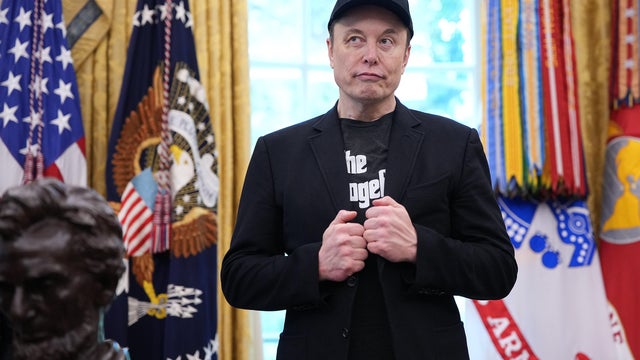

No response returned

Washington — President Trump said Monday that the U.S. will impose 100% tariffs on countries that do business with Russia if there is no peace deal to end the war in Ukraine within 50 days, unveiling his plans to implement secondary sanctions as his frustration with Russian President Vladimir Putin grows.
"We're going to be doing secondary tariffs if we don't have a deal within 50 days. It's very simple," Mr. Trump said in the Oval Office, alongside NATO Secretary General Mark Rutte. "And they'll be at 100%."
"We are very unhappy, I am, with Russia," the president explained.
Mr. Trump also said the U.S. has reached a deal to sell weapons to NATO nations, and Rutte said those countries will in turn send weapons to Ukraine to replenish their depleted stockpiles. The Pentagon shipments of some weapons shipments to Ukraine earlier this month, but Mr. Trump last week, saying Ukraine must be able to defend itself.
"We've made a deal today where we're going to be sending them weapons and they're going to be paying for them," Mr. Trump told reporters in the Oval Office. "We, the United States, will not be having any payment made. We're not buying it, but we will manufacture it, and they're going to be paying for it."
"This is really big," said Rutte, who said Mr. Trump called him last week to inform him of his decision. "And the decision is that you want Ukraine [to have] what it needs to have to maintain to be able to defend itself against Russia, but you want Europeans to pay for it, which is totally logical."
Mr. Trump on Monday expressed frustration with Putin following his multiple calls with the Russian leader since taking office in January.
"I always hang up, say, 'Well, that was a nice phone call.' And then missiles are launched into Kyiv or some other city and I say, 'That's strange.' And after that happens three or four times, you say, the talk doesn't mean anything," he said.
"He's — I don't want to say he's an assassin, but he's a tough guy," Mr. Trump said of Putin, adding that Putin has fooled other presidents, "but he didn't fool me."
"Ultimately, talk doesn't talk, it's got to be action, it's got to be results," Mr. Trump said.
Zelenskyy posted on X Monday afternoon that he spoke with Mr. Trump, and thanked him and the U.S. for the "willingness to support Ukraine."
"We discussed the necessary means and solutions with the president to provide better protection for people from Russian attacks and to strengthen our positions," . "We are ready to work as productively as possible to achieve peace."
Some in Congress have pushed for even higher secondary sanctions on Russia as the war grinds on. Republican Sen. Lindsey Graham and Democratic Sen. Richard Blumenthal are pushing legislation in the Senate that would give the president the ability to impose tariffs of up to 500% on any country that does business with Russia. Graham told on Sunday that these sanctions would give Mr. Trump a "sledgehammer" to end the war.
In a joint statement Monday, Graham and Blumenthal said the president's announcement was "a real executive hammer to drive the parties to the negotiating table."
"The goal is not more tariffs and sanctions — the goal is to entice Putin to come to the peace table," they said.
The senators said they will continue their legislative work to implement up to 500% tariffs on countries that buy Russian oil and gas.
Graham also told "Face the Nation" that the U.S. has "given Ukraine a lot. We give them the money, we give them military aid." But he noted that there could be a "plan where America will begin to sell to our European allies tremendous amounts of weapons that can benefit Ukraine."
Republican Rep. French Hill, who spearheaded legislation during the Biden administration giving the president authority to seize foreign assets, said on "Face the Nation" on Sunday that now is the time to act.
"I think it's time for the president to convert those seized assets to a trust account for the benefit of Ukraine," Hill said.
No American president has ever seized the sovereign central bank assets of a country that the U.S. is not at war with. Former U.S. officials told TheNews that the Biden administration declined to use that authority because of European opposition related to the unintended consequences on their own banking systems and economy that might result from seizing those state assets.





